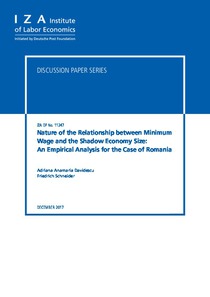Nature of the relationship between minimum wage and the shadow economy size: an empirical analysis for the case of Romania
"The recent increase in the minimum wage in Romania in early May 2016 represented a popular topic at the national level, which indicated that aggressive increases in the minimum wage could create a competitiveness problem in the context of a relatively high level of informal economic activities...
| Main Authors: | , |
|---|---|
| Institution: | ETUI-European Trade Union Institute |
| Format: | TEXT |
| Language: | English |
| Published: |
Bonn
2017
IZA |
| Subjects: | |
| Online Access: | https://www.labourline.org/KENTIKA-19395634124911138169-Nature-of-the-relationship-bet.htm |
| _version_ | 1771659897201491970 |
|---|---|
| author | Davidescu, Adriana Anamaria Schneider, Friedrich |
| author_facet | Davidescu, Adriana Anamaria Schneider, Friedrich |
| collection | Library items |
| description | "The recent increase in the minimum wage in Romania in early May 2016 represented a popular topic at the national level, which indicated that aggressive increases in the minimum wage could create a competitiveness problem in the context of a relatively high level of informal economic activities. The objective of this paper is to analyse the nature of the relationship between the minimum wage and the size of the Romanian shadow economy using quarterly data for the period 2000-2015. The MIMIC model has been used to estimate the dimension of the shadow economy, and the empirical results revealed that unemployment, self-employment, indirect taxation and a lack of trust in the government are considered the main causes of Romanian informality. The results also indicated that the Romanian shadow economy decreased until 2008 to a value of approximately 27.8% of the official GDP. During the economic crisis, a slow increase in the shadow economy occurred, whereas in recent quarters, a slow decrease was observed. The potential effect of an increase in the minimum wage on the size of the shadow economy has been analysed using the Granger causality approach with vector error correction models. The empirical results indicated that an increase in the minimum wage can be considered a long-term supporting factor for the shadow economy because it increases informal economic activities, as firms will seek alternative methods of circumventing authorities. However, the empirical results do not support any effects of an increase in the minimum wage in the short run." |
| format | TEXT |
| geographic | Romania |
| id | 19395634124911138169_4b3ee0f74e984cf98b56e5b9d5181a47 |
| institution | ETUI-European Trade Union Institute |
| is_hierarchy_id | 19395634124911138169_4b3ee0f74e984cf98b56e5b9d5181a47 |
| is_hierarchy_title | Nature of the relationship between minimum wage and the shadow economy size: an empirical analysis for the case of Romania |
| language | English |
| physical | 34 p. Digital |
| publishDate | 2017 |
| publisher | Bonn IZA |
| spellingShingle | Davidescu, Adriana Anamaria Schneider, Friedrich minimum wage informal economy hidden economy Nature of the relationship between minimum wage and the shadow economy size: an empirical analysis for the case of Romania |
| thumbnail | https://www.labourline.org/Image_prev.jpg?Archive=131100295938 |
| title | Nature of the relationship between minimum wage and the shadow economy size: an empirical analysis for the case of Romania |
| topic | minimum wage informal economy hidden economy |
| url | https://www.labourline.org/KENTIKA-19395634124911138169-Nature-of-the-relationship-bet.htm |

